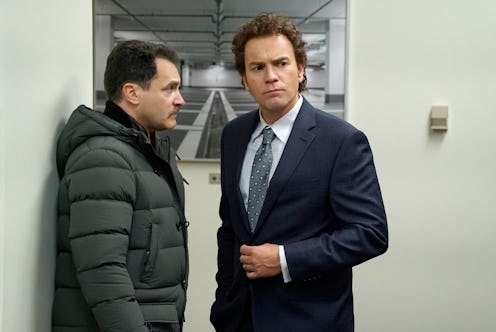
Fargo's latest season, like those before it, tells a story of crime gone unbelievably wrong in snowy Minnesota. While fans who have been waiting for the shows third season have been excited to dive back into the snowy plains of the midwest, the show throws everyone for a loop by having the opening of Fargo Season 3 take place in an interrogation room in East Berlin in 1988. The events of the prologue occur 22 years before the main events of Fargo Season 3 — not to mention that there's an Atlantic Ocean's worth of distance and then some between the two scenes. And the East Berlin events aren't referenced at any point in the rest of the episode. So what's the deal with this strange and incongruous first scene?
Much like the opening of Season 2, which features a film crew waiting for the arrival of then-actor Ronald Reagan, the opening of Season 3 is a prologue that sets up the themes of the season and features a specific homage to a popular work of fiction. The Season 2 premiere opens with two people waiting on a film set for Reagan, in reference to Samuel Beckett's Waiting for Godot. Season 3 opens with what appears to be a tribute to a similar work of fiction, which points out the absurdity of the world.
Franz Kafka's The Trial follows a man as he undergoes a confusing and difficult legal process in an attempt to clear his name. The biggest obstacle? He has no idea what he's done wrong, despite the fact that everyone tells him that he'll most certainly be found guilty of his crimes. The opening scene of Fargo's third season mirrors this, to the point of being set in Germany. (Kafka was a German-speaking citizen of Prague, located in what was then a part of the Austro-Hungarian Empire.)
In the scene, a government official is interviewing a man he believes to be a Ukranian immigrant. The man he's interviewing is, in reality, German citizen Jakob Ungerleider. Instead of admitting his mistake, however, the government official uses selective logic to argue that Jakob is, in fact, the immigrant he's looking for. He then accuses the man of killing his girlfriend, despite Jakob insisting he has a wife, not a girlfriend, and she has different surname than the murder victim. He insists that his wife was alive just an hour ago, and offered the men who took him away tea. The government couldn't care less.
(It's worth noting that this isn't the first time that Fargo has referenced this particular Kafka story. The second episode of Season 2 is called "Before The Law," which is the title of a parable told in "The Trial.")
Jakob falls silent when the government official shows him a picture of a body. He then tells Jakob that the wife, the fake name, that everything Jakob is saying "is called a story and we are not here to tell stories. We are here to tell the truth." Then, in an ironic punch to the gut, Fargo's famous "This is a true story" disclaimer is displayed. The government official seems to believe that stories and the truth are mutually exclusive, but then what is a "true story"?
The haunting tragedy of Jakob's situation harkens back to Kafka's classic novel and establishes a theme for the characters throughout the rest of the premiere: they're all trapped. Emmit Stussy is trapped in a money laundering scheme; Ray Stussy is trapped by poor circumstance; and Gloria Burgle is trapped by automatic doors that refuse to open for her.
They're all trapped and none of it really makes any sense, but nothing in Fargo tends to make much sense. Things in Fargo just happen, leaving the characters to pick up the pieces.
Editor's note: A previous version of this article incorrectly identified Germany as Kafka's home country.